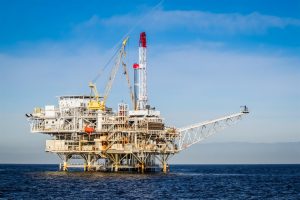This is the story of how anti-fossil fuel campaigners and off-shore oil workers have come together to push for a fair transition to renewable energy.
It starts at a barbecue.
Picture the scene, a group of oil workers gathering out the back of their union office in Aberdeen to share burgers and beer. In walk some environmental campaigners…
“It would never have worked if Gaby and Ryan hadn’t had the balls to come into the lion’s den,” said Scott Agnew, one of the workers there that day.
He’s talking about Gaby Jeliazkov, of Platform, and Ryan Morrison, of Friends of the Earth Scotland.
Scott, who has worked in the industry for three decades, explained how the meeting came about: “The union guy called me up and said, I’ve got this Platform group on my back, they’re probably a load of lentil eaters but this Gaby person is talking sense. So we invited them to meet with us.”
“They were good company. They weren’t banging on about closing the industry down. They were willing to listen and I thought, we’re not too far apart here. We all want a just transition. I could work with these people. Gaby asked for my number and it went from there.”
What they did
In fact, Gaby had been working for months on making contacts like Scott. She said: “We went to the pub a lot. You need to put the time in with people. We’d get the train up to Aberdeen and scour the city for oil workers and some days you’d only come back with one contact.”
In the year leading up to their first meeting, Platform, Friends of the Earth Scotland and Greenpeace UK had launched an online questionnaire for oil workers that was released during the first wave of Covid in 2020.
Gaby explained: “Usually when campaigners run a poll they already have a campaign in mind and the poll is to back it up, but with the offshore workers we asked them about their top priorities, rather than asking them if we were right.”
“We received over a thousand responses. I was thrilled. It was way more than we expected.”
Their next step was to get on the phone, so they spent weeks making calls between 4pm and 6pm every day to try to speak to the workers who had completed the questionnaire. They found that most people were more than happy to talk.
“People would not get off the phone,” said Gaby. “It was incredibly labour intensive but if you can get people talking they start to trust you and so you can’t miss this step.”
“We didn’t front load climate. We listened. Every worker had anecdotes about near-miss accidents. They’re basically working on a floating bomb.”
“Training came out as one of the big issues so we did a follow up training survey asking super specific questions like, ‘what would you spend on this particular qualification?’”
Most oil workers have to fund their own training and the cost can run into hundreds of pounds per course.
As Scott explained: “To work in the north sea you need three types of safety certificate – oil and gas, shipping, and offshore wind. Most of the courses are the same, and they cost a lot of money, but if you turn up to a fire on an oil rig or an offshore wind farm, the fire doesn’t ask you which certificate you have to fight it.”
After digging deeper with the workers on the phone calls, the team invited them to join a series of workshops designed to build a set of policy demands, all the while continuing to build trust. Gaby’s colleague at Platform, Rosemary Harris, was part of the team working alongside the oil workers. She spoke about her initial feelings of awkwardness.
“I’m really conscious of how I sound, I’m from London, I’ve got quite a posh accent, and it made me feel quite hesitant and worried,” she said. “It weighed on me a bit but what switched it for me was understanding it’s ok as long as I’m not coming into a conversation thinking that I know better.”
Gaby too had felt a similar hesitancy in the early days. “It’s quite daunting to employ the organising tool of giving people a little task to complete to push them up that rung of engagement,” she said. “Sometimes I held back, protecting their time, but the people who did complete the small tasks were the ones who stuck around.”
What happened
The first output from the partnership was the Offshore report released in October 2020 – a deep dive into the oil and gas workers’ views on industry conditions and how it might transition from fossil fuel to renewables, and the culmination of the hours the team had spent engaging with workers by that point.
The report made recommendations within three areas: put oil and gas workers at the heart of future policy making on energy transition; improve job security and working conditions for oil and gas workers to mitigate the risk of them leaving the energy sector altogether; and address the barriers to entry for oil and gas workers within the renewables industry.
Gaby said it was an important milestone. “Even though we haven’t achieved everything yet it [the report] functioned as a trust building exercise,” she said. “The workers knew we were listening and when we followed up with them we had a tangible thing to show them.”
The relationship has continued to strengthen over the past couple of years. Platform and Friends of the Earth Scotland have continued to work alongside oil workers – taking meetings with the UK and Scottish Governments together and speaking with the media to put forward their arguments.
Two years on from that barbecue out the back of the union office in Aberdeen came the Our Power report, released this year, which includes a set of demands from workers that were crafted during the workshops that succeeded the initial questionnaires and phone calls.
They included: a training regime built to keep workers safe instead of for profit; establishing universal rights and a wage across the UK Continental Shelf; and clear accessible pathways out of high carbon jobs.
Scott is still heavily involved in the process. “There were 10 demands in the report and each of them was sent to us beforehand by Platform,” he said. “We had calls with the team and we were consulted right up to the day of release. It was all of us together. We weren’t just talking heads, they were all of our demands and nobody’s voice was left out.”
“We’ve started so we’ll finish,” he said. “It has to keep getting pushed to the public and the Governments at Westminster and Holyrood. We all have to keep pushing until everyone’s on board.”
Meanwhile, the Platform team is clear that, after years of environmental campaigners putting forward policies to move away from fossil fuels, having oil workers like Scott on board from the beginning has been key to its political strategy.
“There’s no credibility to environmental campaigners parachuting in and deciding what’s needed for offshore workers and communities,” said Rosemary.
“I’m not qualified to decide exactly what needs to happen for a just transition for them, and politicians know it too. There’s something really powerful about showing it’s not just the usual suspects demanding changes and that the workers themselves want action and know what that action should be.”
The team is now preparing to influence the debate on fossil fuels in the run up to the general election, including, they hope, working more closely with unions.
Rosemary said: “We shouldn’t be talking about phase out without also talking about just transition and concrete plans for support. We want to make sure the workers who came up with these demands are part of that discussion.”
What you can do
We asked Gaby, Rosemary and Scott for their advice on how to build a partnership like the one they share.
Gaby and Rosemary:
Pay people for their time. “We always paid people for their time, whether it was for joining a workshop or coming with us to Westminster. We hired offshore workers as organisers, and contracted them for four days a month, as they were helping us with their expertise.”
Protect the people you’re working with. “In the early days, we were very clear with every media request that interviews had to be anonymised [due to the risk to workers’ jobs for speaking out]. This cost us articles. With the workers we went at the pace of the relationship. Those who appeared on the Our Power video had been with us for three years.”
Allow people to be themselves. “It worked because when we went into meetings with MPs and MSPs, we didn’t want them [the workers] to say things we told them to say. Whatever workers say is the barrier has to be solved, otherwise they won’t work in renewables.”
Stay true to your values. “You can’t sacrifice core values to work across difference but you can figure out what it is you want to work on together. Find the right balance between humility and confidence – knowing you’re stepping into someone’s space but having the confidence to express why you’re there and assert your values.”
Give the project enough time and be persistent. “Everything is going to take a year longer than you think it will. We were a year behind for the entire project and our funders were very understanding about that. Success will wax and wane – sometimes people won’t pick up the phone, sometimes only five people will show up to something. You just have to keep going.”
Scott:
Focus on the right people. “Most people got it. There are always 10-20% who don’t, but most people know it’s time for a change. Most people just need a push.”
Be social. “Meet people. Get to know them. Don’t preach or push your arguments down their throats. Get in touch with the people you want to speak to, you might not hear back right away, but keep persisting.”
Don’t get sidetracked by what you disagree on. “You’ll never agree on every single point but there’s common ground to be found. I think that the oil industry in the UK should continue until we don’t need it. Platform won’t totally agree on that but we can still work together.”
Resources
If you want to find out more you can read the Our Power: Research methodology and lessons learned briefing which is an in-depth evaluation of the campaign including lessons learned.
Here’s the initial report – Offshore: Oil and gas workers’ views on industry conditions and the energy transition, and its follow up – Our Power: Offshore workers’ demands for a just energy transition.
If you’re interested in bridging divides you might find these helpful:
A Turkish Opposition Leader Is Fighting Erdoğan With ‘Radical Love’ – article in The Atlantic
How to change people’s minds with Dave Fleischer – Larger Us podcast


